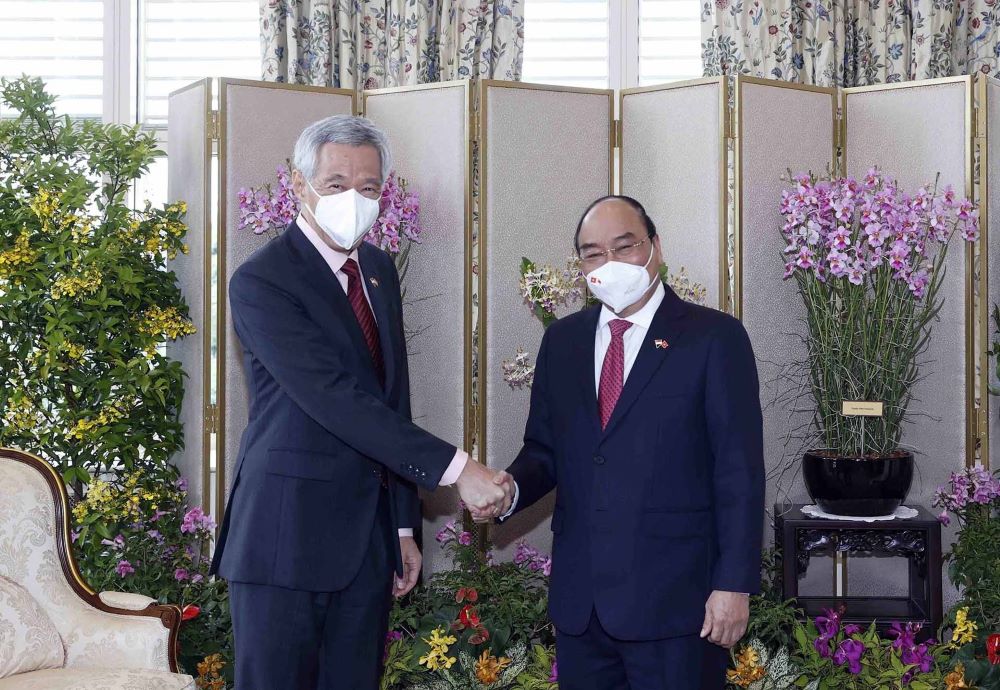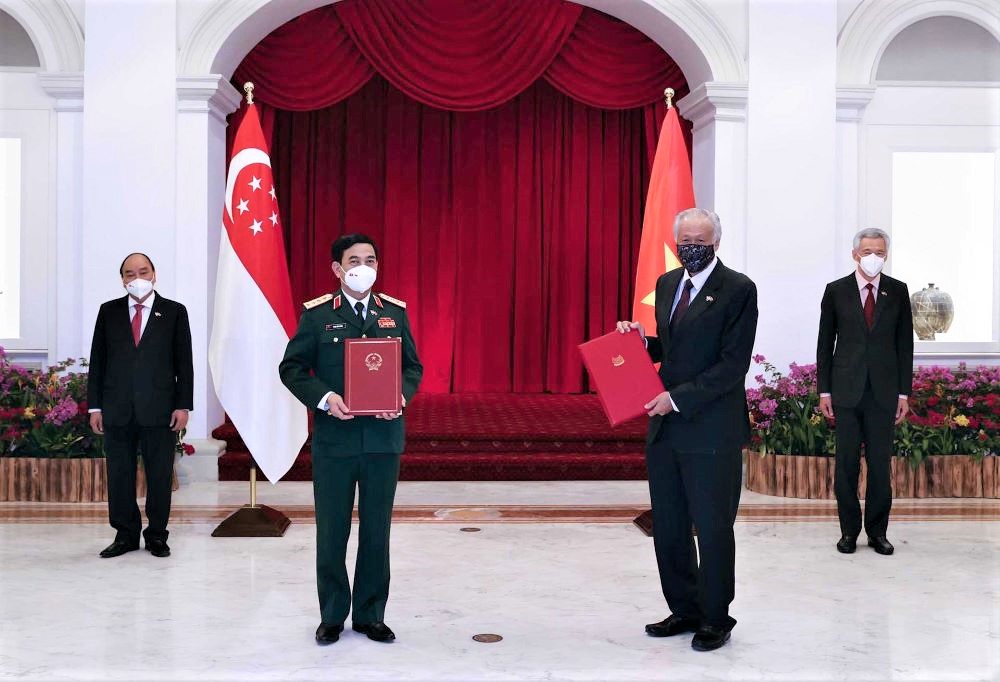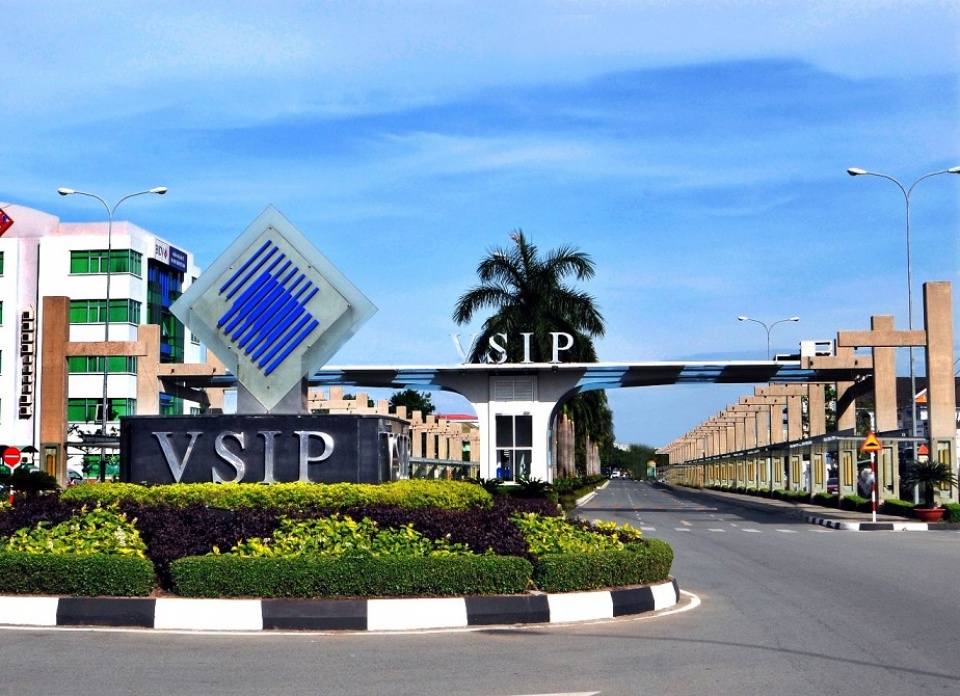Vietnam-Singapore joint statement: Recovery together from Covid-19
Vietnam and Singapore signed a series of agreements and nearly 30 business memoranda of understanding during the ongoing state visit.
Vietnam and Singapore vow to work closely to support each other to recover together from Covid-19 in a joint statement issued during the ongoing visit paid by Vietnamese President Nguyen Xuan Phuc.
Vietnam's President Nguyen Xuan Phuc (R) and Singapore's Prime Minister Lee Hsien Loong in Singapore on Feb 25. Photos: VNA |
The two countries recognized the importance of closer cooperation to enable both countries to recover together, and emerge stronger from the pandemic, toward a robust, inclusive, and sustainable recovery.
New areas of cooperation: Both sides stressed the importance of expanding cooperation in new areas of mutual interest such as the digital economy and green economy - including renewable energy, carbon trading and services, low-carbon technologies, and green finance.
Restoring safe travel: They will work towards the mutual recognition of vaccination certificates, which will facilitate the safe and early resumption of regular commercial travel between both countries while promoting the mutual provision of medical supplies and equipment between the two countries since the beginning of the pandemic.
Digital transformation: The signing of the Memorandum of Understanding (MOU) on Cooperation in the field of Digital Economy will operationalize the Joint Working Group to implement concrete digital economy collaborations for bilateral and regional digital connectivity.
Enhancing supply chain connectivity: Both sides reaffirmed mutually beneficial cooperation in infrastructure development and smart logistics, to facilitate market access in both countries and the region, to better support businesses and the innovation ecosystem for innovation and economic growth.
In this regard, they signed the new bilateral Implementation Workplan on Intellectual Property cooperation to finalize the details of the proposed launch of a pilot Collaborative Search and Examination (CS&E) program that enhances connectivity and facilitates the entry of innovative products and services into the two countries.
Building green economy: Given the imperatives of climate action as underscored by COP26, Vietnam welcomed Singapore’s interest to support its ongoing energy transition, including investments in low-carbon energy technologies such as Energy Storage Systems (ESS), renewable energy, with a view to export part of the electricity to Singapore in the longer term.
| Vietnam and Singapore ink agreement defense cooperation on Feb 25. |
Strengthening Strategic Partnership
To enhance the Strategic Partnership that has been elevated since 2013, Vietnam and Singapore, in the attendance of President Nguyen Xuan Phuc and Prime Minister Lee Hsien Loong, inked a series of bilateral agreements, including the (a) renewal of the Defence Cooperation Agreement; (b) MOU on economic and trade cooperation; (c) MOU on cooperation in digital economy; (d) MOU on the Cooperation Program for 2022-2024; and (e) Implementation Workplan on Intellectual Property Cooperation.
In addition, on the sidelines of the state visit, 28 business MOUs were signed between Vietnam’s provinces and businesses with their counterparts.
On this occasion, the two countries reaffirmed multi-faceted cooperation in areas including trade and investment, defense, education, finance, transport, agri-trade, intellectual property, technical assistance, and people-to-people ties.
| VSIP in the northern province of Bac Ninh. Photo: cafeland |
In terms of economics, the two sides acknowledged the 25th Anniversary of the first of the Vietnam-Singapore Industrial Parks (VSIPs) and welcomed VSIPs to enhance cooperation and scale expansion in Vietnam toward green, high-tech and innovative parks, and notable contributions to its development.
Regarding human resource development, they signed the agreement on the Study Visit Program and Executive Education Program for Senior Communist Party of Vietnam (CPV) Officials (2021-2023). Over the past years, Singapore has provided training to 20,000 Vietnamese officials.
Concerning defense cooperation, the leaders welcomed the renewal of an agreement on bilateral defence cooperation, which would pave the way for regular dialogues, military-to-military exchanges, education and training, cooperation in military medicine, military intelligence, counter-terrorism, search and rescue, and humanitarian assistance and disaster relief. Meanwhile, they agreed to combat transnational crimes such as terrorism, drug trafficking, human trafficking, economic crimes and cybercrimes.
The two countries will promote people-to-people exchanges and entrepreneurship cooperation of the two peoples; and looked forward to stepping up inter-cultural activity, including through the gradual resumption of tourism, and the expansion of education and research exchanges.
Towards regional, international issues
Both nations emphasized the importance of strengthening ASEAN Centrality and unity, upholding rules-based multilateralism to promote peace and stability in the region. They committed to pursue mutual support at international and regional fora, especially within ASEAN and ASEAN-led mechanisms.
They reiterated ASEAN’s consistent position on the South China Sea and reaffirmed the importance of maintaining peace, security, stability, safety, and freedom of navigation and over-flight in and above the South China Sea, and peaceful resolution of disputes without resorting to threat or use of force, in accordance with international law, including the 1982 United Nations Convention on the Law of the Sea (UNCLOS).
They underscored the importance of the full and effective implementation of the Declaration on the Conduct of Parties in the South China Sea (DOC) in its entirety, and to conduct substantive negotiations towards the conclusion of an effective and substantive Code of Conduct in the South China Sea (COC) in accordance with international law, including 1982 UNCLOS.
The leaders expressed deep concern about the situation in Myanmar, including the lack of progress in the implementation of the ASEAN Five-Point Consensus. While reaffirming ASEAN’s principle of non-interference, the Leaders expressed support for ASEAN’s active role in assisting Myanmar, an integral part of ASEAN Family, to overcome the current crisis and to return to normalcy.














